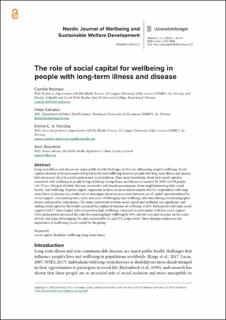The role of social capital for wellbeing in people with long-term illness and disease
Peer reviewed, Journal article
Published version
Permanent lenke
https://hdl.handle.net/11250/3123601Utgivelsesdato
2023Metadata
Vis full innførselSamlinger
Originalversjon
Nordic Journal of Wellbeing and Sustainable Welfare Development. 2023, 2 (2), 53-67. 10.18261/njwelSammendrag
Long-term illness and disease are major public health challenges in Norway influencing people’s wellbeing. Social capital is known to be associated with good health and wellbeing, however people with long-term illness and disease have increased risk of less participation and social isolation. Thus, more knowledge about how social capital is associated with wellbeing in people living with long-lasting illness and diseases is needed. In 2019, 16,558 people (18–79 yrs.) living in Østfold, Norway, answered a web-based questionnaire about neighborhood quality, social factors, and wellbeing. Stepwise logistic regression analysis on an analytical sample of 6,517 respondents with longterm illness or disease was conducted, to investigate the main association between social capital (operationalized by social support, civic participation, trust, and sense of belonging) and wellbeing, after introducing sociodemographic factors and possible confounders. The main association between social capital and wellbeing was significant, and adding social capital to the model increased the explained variance of wellbeing to 43%. Participants with high social support had 2.7 times higher odds of reporting high wellbeing, compared to participants with low social support. Civic participation increased the odds for reporting high wellbeing by 30%, and for each unit increase on the scales of trust and sense of belonging, the odds increased by 14 and 23%, respectively. These findings underscore the importance of facilitating social capital for this group.

